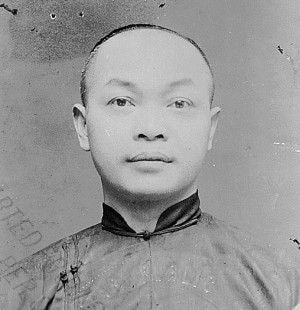 "A Young Wong Kim Ark" "A Young Wong Kim Ark" As the child of immigrants, I am extremely thankful for the advancements the United States has made to make this possible. However, these advancements weren't without a fight. In the 1800s, the U.S. was in a state of yellow peril. As more and more Chinese immigrants entered the U.S. at the prospect of striking a fortune in the West Coast, the people of the United States began to worry about the economy and job stability. In 1882, President Arthur signed the Chinese Exclusion Act, forbidding anyone of this demographic from immigrating to the United States. It also excluded all Chinese nationals from being able to apply for a U.S. citizenship. In many ways, this Act was tremendously flawed. It not only perpetuated racism towards the Chinese-Americans who were already in America, it also proved a huge problem for the children of immigrants, like Wong Kim Ark. Born in San Fransisco in 1873, Wong Kim Ark was by all definitions, a U.S. citizen born on American soil (under the clause of the 14th amendment). Both his parents were Chinese immigrants who were not U.S. citizens, so they had to move back to China. Wong continued to live in California, and would often travel between the two countries to visit his family and build a life in America. His first reentry was smooth, but upon his second reentry a few years later, he was held at the border. The United States proclaimed that because Wong was a child of Chinese citizens, he was a Chinese citizen too, no matter where he was born. Furious with this, Wong gathered legal support and fought his way to the U.S. Supreme Court to defend his case. The debate was whether Wong's birth in the U.S. was enough to make him a citizen of the United States, and while lawyers claimed he was a Chinese national, the Supreme Court disagreed by a 6-2 vote and held that a child born in the United States is a citizen of the U.S. As a result, Wong's triumphant case became a huge legal precedent for future cases for immigrants and citizenship eligibility. It protects the rights of groups who may be excluded and targeted for dual-citizenship. In an interview by the NPR with Wong's granddaughter, it was revealed that Wong still faced discrimination in the U.S. after he won the case, prompting him to return to China, where he passed away. Wong's fight for the civil rights of immigrants and U.S. citizenship should not be forgotten, especially as our current administration tightens controls on immigration. The United States was built on freedom and opportunity for all, what would we be to disregard these values? Author: Carina Sun
0 Comments
Leave a Reply. |
In Honor of Asian Pacific American Heritage MonthWe are bringing you the stories of inspirational Asian Americans from history. Read More:5/30/20 - The Exceptional Example Ronald Takaki Set
5/27/20 - The Incredible Legacy of Kalpana Chawla 5/26/20 - When Marrying a Non-American Meant Losing Your Citizenship 5/25/20 - Honoring the 442nd Infantry Regiment 5/24/20- A Glimpse at Asian-Americans in Hollywood -- Miyoshi Umeki 5/22/20 - The Oriental Schools of San Fransisco 5/21/20 - Equality For All Colors - Yick Wo v. Hopkins 5/20/20 - An End To Police Brutality: Peter Yew's Stand 5/19/20 - Finding His Form: Linsanity in 2012 5/18/20 - Internment and Injustice: Fred T. Korematsu 5/17/20 - The Courageous Stand of Gene Viernes and Silme Domingo 5/16/20 - The Unbreakable Spirit of Wong Kim Ark 5/15/20- The Admirable Perseverance of Patsy Takemoto Mink 5/13/20 - The Lasting Legacy of Grace Lee Boggs 5/12/20-Remembering "The Forgotten" -- The Chinese migrants who built America's first Transcontinental railroad 5/11/20 - The Singing Neurosurgeon: Dr. Ayub Ommaya |

 RSS Feed
RSS Feed